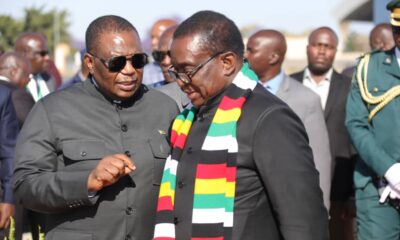GOVERNMENT’S criminal neglect of the healthcare system, its incapacitation and failure to plan for the Covid-19 resurgence – almost a year after the first index case was reported – is a serious indictment of President Emmerson Mnangagwa’s leadership, analysts say.
NYASHA CHINGONO
Usually great leaders emerge in times of challenges and crises. Indeed, great leaders do not reach the height of success without facing their share of minor challenges and major crises.
In fact, most outstanding leaders would say that working through difficulties made them even better. A truly great leader will rise to the top in times of adversity, when difficult decisions are made and decisive action must be taken, analysts say.
They say it takes someone with a clear vision and unstoppable fortitude to lead a country through its worst times, whether they involve economic troubles, public relations nightmares or policy failures.
“The ultimate measure of a man is not where he stands in moments of comfort, but where he stands at times of challenge and controversy.”– Martin Luther King Jr.
The rapid and unprecedented spread of Covid-19 has quickly eclipsed other epidemics, both in size and scope. In addition to the deadly human toll and disruption to millions of lives, the economic damage is significant and far reaching.
First and foremost, leaders have to protect their people and country. In a situation like the Covid-19 environment, leaders have to come up with a strategy, plan and tactics of how to deal with the problem.
Regular communication is critical.
Pandemics are often characterised by an initial lack of knowledge about the pathogen itself. This was an enormous challenge for leaders and the people to find and to identify the right and important information and to make sure that people are always up-to-date, without overloading them with too much detail.
Analysts say good, direct and clear communication, both top-down and bottom-up, is a core element of good leadership. Leaders have to deliver meaningful and transparent information regarding the situation and steps taken to handle it, making planning indispensable.
Healthcare workers at the frontline need their leaders to be with them, to give direction and updates.
However, analysts say Mnangagwa is not providing leadership. Instead there is currently a leadership vacuum.
While in the past top government officials could fly out to seek medical treatment in countries such as China, India, Singapore or South Africa, the Covid-19 global pandemic has forced Zimbabwe’s ruling elites to seek medical help in the country’s failed health sector.
After nearly 41 years in power, Zanu PF elites continue to loathe the country’s ill-equipped medical institutions, choosing to spend millions of dollars in foreign hospitals, while condemning ordinary Zimbabweans to die from treatable diseases.
With Zimbabwe having breached the 1 000 Covid-19 fatalities mark this week, a grim milestone considering the state of the health sector, analysts have raised fears of a health catastrophe.
Among the 1 000 Covid-19 deaths are four ministers: Lands, Agriculture and Rural Resettlement minister Perrance Shiri; Foreign Affairs minister Sibusiso Moyo; Manicaland resident minister Ellen Gwaradzimba; and Transport minister Joel Biggie Matiza.
While death is inevitable in a pandemic and it is not in our nature to celebrate a person’s demise, the second wave has exposed the government’s lack of leadership in a time of crisis.
Zimbabwe recorded its first Covid-19 case in March last year and, instead of coming up with a coherent plan and setting up structures to fight the relentless virus, Zimbabwe’s leadership took a backseat, finding comfort in the low numbers of infections and deaths.
Despite calling for an early lockdown, no plan was put in place to improve the conditions of service for frontline workers and boost medical equipment or at least make plans for a vaccine. Testing, contact testing and quarantine measures have also been weak.
It seems the government’s only plan is a hard lockdown where the security forces find every excuse to clampdown on fundamental political and civil liberties.
Mnangagwa addressed the nation on Saturday, but his speech left Zimbabweans with more questions than answers, as it was evident the government did not have a strategy to contain the coronavirus.
“Help is coming,” Mnangagwa said without giving panic-stricken Zimbabweans specific timelines on when this miraculous “help” would come.
His address was devoid of a clear plausible plan to deal with the scourge of the virus that swept away three ministers within a week.
The address did not “address” the real issues, no pun intended, namely the myriad of challenges local health institutions are facing with regards to lack of personal protective equipment (PPE), ventilators, risk allowances and better working conditions.
The frontline health workers have often bemoaned neglect by the government and, with over 1 000 having contracted Covid-19, some health staff are reluctant to report for duty. Political analyst Ibbo Mandaza said the country is on autopilot.
“This is a serious indictment on government, there is no one thinking seriously about this pandemic. We are on autopilot and it is terrible. There is serious lack of leadership,” Mandaza said.
He said the government lacks a coherent plan on how to deal with the virus.
“There appears to be no coherent plan and lockdown is the only plan they have,” Mandaza said.
Mandaza pointed out the lack of a vaccination programme to deal with further waves of the virus, adding that the lockdown had been highly militarised with the security forces on the forefront of enforcement.
Another political analyst Stephen Chan said Zimbabwean ministers, who in the past could get treatment abroad, were stuck in a non-functional health system.
Chan said it was an indictment on government and its failure to invest in the health delivery system, which has proven to be a critical sector in desperate times.
“Those who contract Covid-19 cannot, of course, travel. So, ministers who are infected cannot fly off to some expensive far-off hospital in another country. For once, everyone is in the same boat. Lack of medical facilities for ordinary people means lack of medical facilities for ministers too,” Chan said.
As part of scrutiny on government failure to set up a contingency plan for Covid-19, The NewsHawks established last week that the country did not have a vaccination programme with clear timelines or a budget.
A senior health official told the publication that the government had not yet formally written to the World Health Organisation requesting to receive vaccines under the international Covax facility.
The government had also shown a lethargic approach in applying for the Chinese vaccine. This follows reports that a country like South Africa is already expecting the delivery of 1.5 million doses from the Serum Institute of India to kick-start phase one of its vaccination programme.
While other countries are secretly clinching bilateral deals with other nations or manufacturers producing the life-saving jabs, Zimbabwe remains on the margins with no clue as to where the country will get the vaccines.
“So, in almost every single respect, the government has no strategy because it cannot afford any strategy,” Chan said.
“Both the Russians and the Chinese have recently offered to provide vaccines to Zimbabwe, but without a timeline, and at a cost. All the vaccines now becoming available were incredibly expensive to develop and to manufacture. It is impossible to give them away for nothing.
“Zimbabwe has no money and no hard plans to acquire the vaccines. It is not yet certain when the African Union vaccine plan will be activated in a huge number of countries, including Zimbabwe,” Chan said.





















